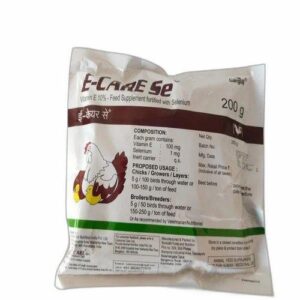SELENIUM + VITAMIN E
Selenium: Selenium is a mineral that is essential for the proper functioning of the body. It is a trace element and is present in small amounts in the soil, water, and some foods. Selenium is available as a dietary supplement and is also found in multivitamin and mineral formulas.
The main use of selenium is as a dietary supplement to maintain adequate selenium levels in the body. It is important for various bodily functions such as immune system function, thyroid hormone metabolism, and DNA synthesis.
Selenium acts as an antioxidant, protecting cells from damage caused by free radicals. It also plays a role in regulating the immune system and reducing inflammation. Additionally, selenium is involved in the production of thyroid hormones and helps in maintaining the overall health of the thyroid gland.
The recommended daily dosage of selenium for adults is around 55 micrograms per day. However, the exact dosage may vary depending on factors such as age, sex, and specific medical conditions. It is important to follow the recommended dosage and consult a healthcare professional for appropriate guidance.
While selenium is generally safe when taken at recommended doses, excessive intake can lead to toxicity. Common side effects of selenium overdose include gastrointestinal disturbances such as nausea, vomiting, and diarrhea. In more severe cases, it can cause selenosis, which is characterized by hair loss, nail brittleness, and neurological symptoms such as irritability and fatigue.
It is worth noting that selenium supplements should be used with caution in individuals with certain medical conditions such as liver and kidney disease. Additionally, selenium supplements can interact with certain medications, so it is essential to inform your healthcare provider about any other medications you are taking.
In summary, selenium is a necessary mineral for the body’s functioning and is commonly used as a dietary supplement to maintain adequate selenium levels. It acts as an antioxidant, supports immune function, and plays a role in thyroid hormone metabolism. However, it is important to follow the recommended dosage and be aware of potential side effects and drug interactions.
Vitamin E: Drug: Vitamin E
Use: Vitamin E is a dietary supplement used to treat and prevent vitamin E deficiency. It is also sometimes used for its antioxidant properties and is believed to have potential benefits for various conditions such as heart disease, cancer, and age-related macular degeneration. However, further research is needed to establish its effectiveness for these uses.
Mechanism of Action: As an antioxidant, vitamin E helps protect cells from damage caused by free radicals. Free radicals are unstable molecules that can cause oxidative stress, which may contribute to the development of certain diseases and aging-related conditions. Vitamin E helps neutralize these free radicals and prevent their harmful effects on cells.
Dose: The recommended daily allowance (RDA) of vitamin E varies depending on age and sex. For adults, the RDA is 15 mg (22.4 IU) per day. However, higher doses may be prescribed by healthcare professionals for certain medical conditions.
Side Effects: Generally, vitamin E is considered safe when taken within the recommended doses. However, high doses may increase the risk of bleeding, especially in individuals taking blood-thinning medications. Other potential side effects of vitamin E supplements may include nausea, diarrhea, stomach cramps, fatigue, headache, and blurred vision. Vitamin E should be used with caution in individuals with certain health conditions, such as bleeding disorders or diabetes.

